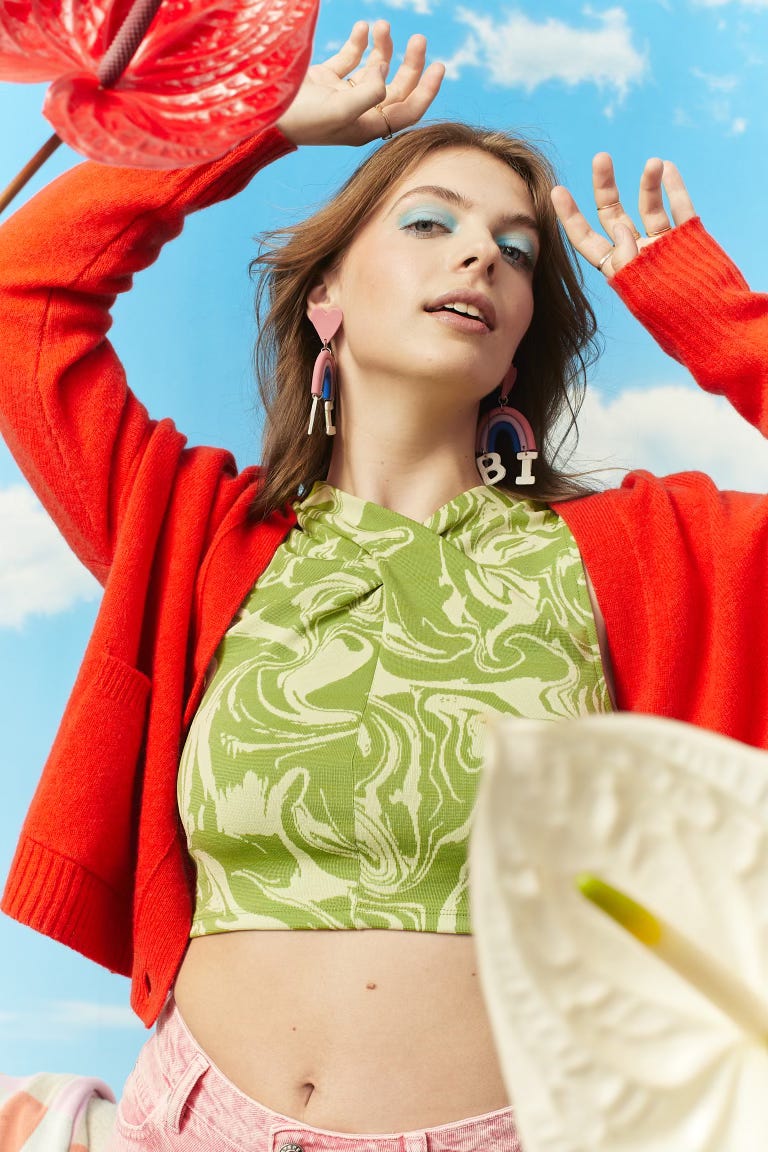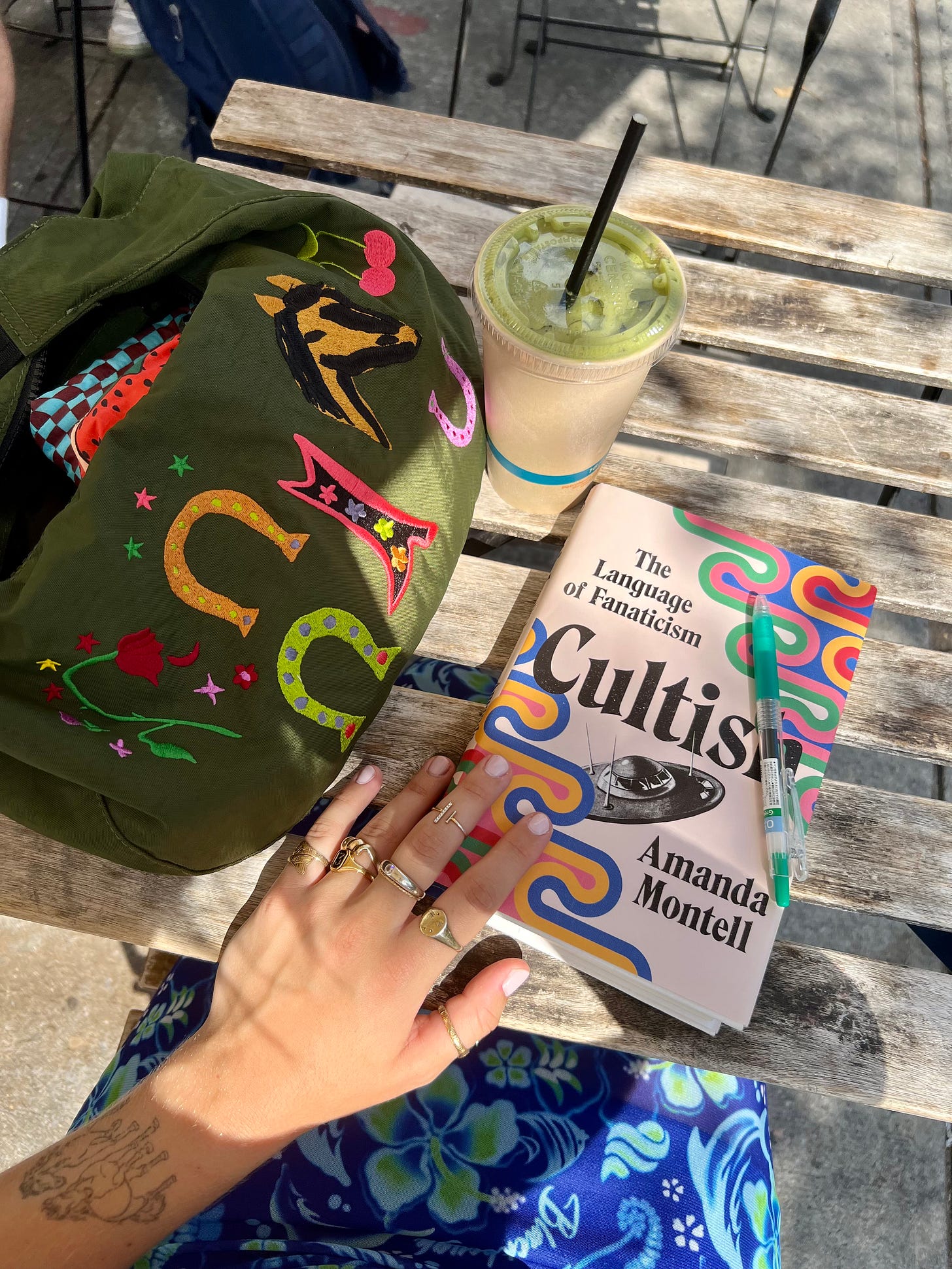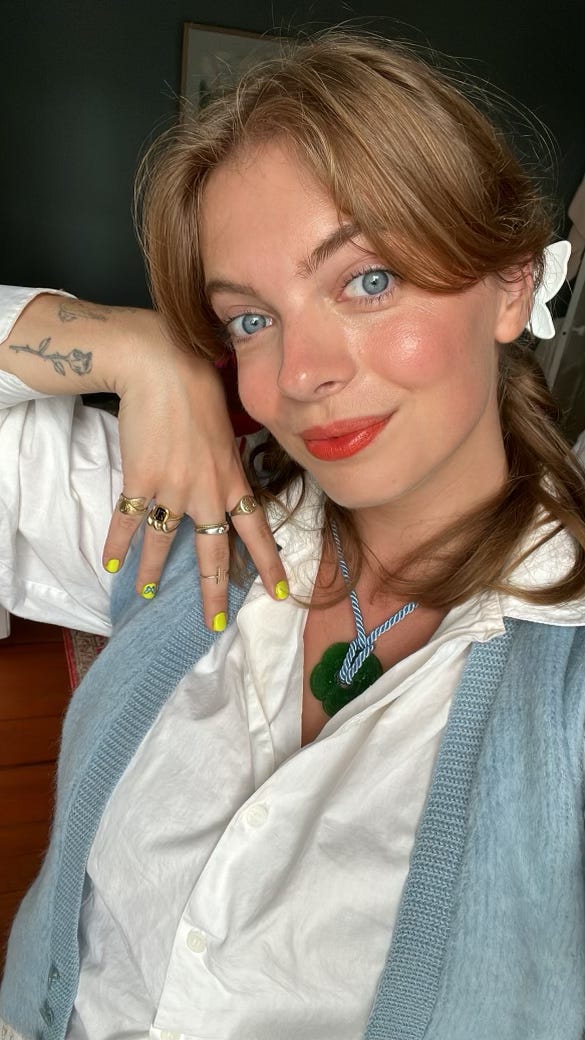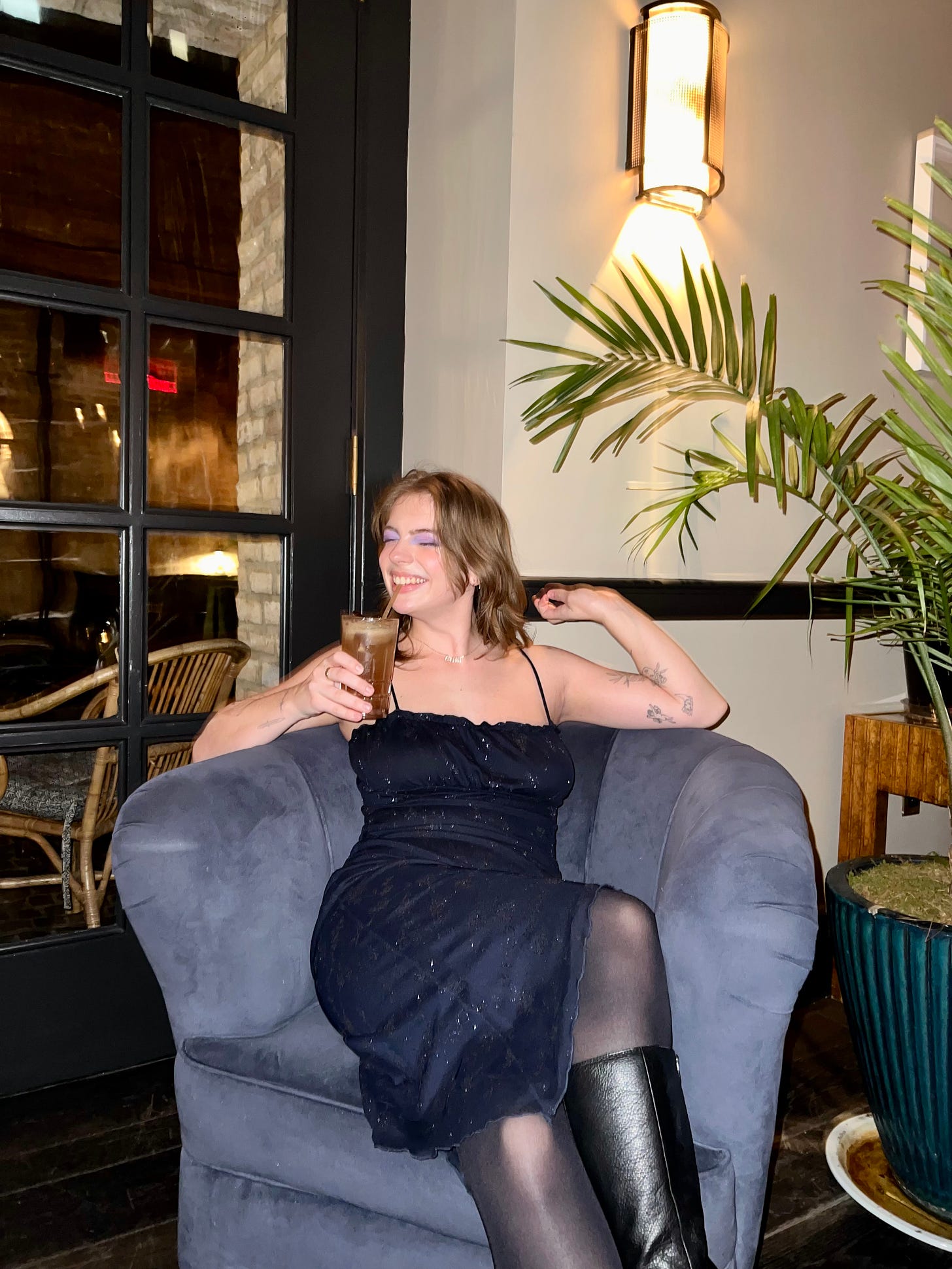Oh, hello again! I had big dreams of getting this Substack out every Thursday morning right at 8 a.m., punctual and put-together and polished, but you know how this whole “life” thing goes, which is why this is coming to you on a Friday morning as I sit sleep-deprived at my kitchen table, covered in dog hair and with zit stickers all over my face. The glamour!
Anyways, let’s talk about some book-y stuff, shall we?
Nina Haines, 25, lives in Brooklyn, where she’s the influencer marketing manager for the stationary company Papier. She’s also the founder of Sapph-Lit, an online Sapphic book club born out of the BookTok world.
Somehow, Nina finds the time to have a full-time job, run a thriving book club, post very aesthetically pleasing and vibey content, and read a shit ton. And I truly do mean that very scientific “shit ton” scale of measurement—she read 114 books last year.
Here, we chat with Nina about Sapphic representation in literature, building a book club out of BookTok, and how she squeezes in so much reading.
⚡Lightning Round⚡
Currently reading: The Book of Desire by Meena Kandasamy
Favorite book of 2022: A Certain Hunger by Chelsea G. Summers
Book most excited for in 2023: Old Enough by Haley Jakobson
How did you start Sapph-Lit?
I founded Sapph-Lit in May 2021. It happened spontaneously and was such a blessing. So I started posting on BookTok the month before because I was miserable at my old job. Because of Covid, I was really feeling isolated from my IRL queer community that I had built in Brooklyn, and I started posting on TikTok about all the books that I was reading in my isolation—a lot of queer fiction and queer nonfiction. And one of my videos blew up in the algorithm and someone commented, can we start a book club? When I get fixated on something, it’s all I can think about, and I took that idea and ran with it. In my professional life, I'm an influencer community builder, so I was like, I know how to do this. I know how to bring people together and engage with them. So I took those skills and resources and applied it to Sapph-Lit. Three hours after I received that comment, we had our home in the Geneva app all set up. We got 50 members in the first 24 hours. And now we have over 7,000 from over 60 countries around the world.
Today, we host monthly book club discussions. We read two books a month, one fiction, one nonfiction, that have Sapphic representation. And we gather on Zoom, we do meet-ups in person in New York. I get to interview tons of authors that I really love and respect. It’s absolutely changed my life.
Who have you interviewed?
Off the top of my head, the most memorable one was Torrey Peters for Detransition, Baby. If you watch that interview, you can see me slowly start to fall in love with her. I was so speechless over how eloquent and intentional she is with her words. She's the smartest woman I've ever met.
How do you define Sapphic literature?
So, mini history lesson: Sapphic comes from Sappho, who was a lesbian poet from ancient Greece. And she came from the island of Lesbos, which is where we get the word lesbian. Sapphic is an umbrella term to describe women loving women—this can include bisexual people, it can include lesbians, and it can include nonbinary people, if they identify with Sapphism.
So when we talk about Sapphic literature, we're talking about a wide breadth of literature and books. It doesn't just have to be a romance book about a Sapphic couple falling in love. In fact, Sapph-Lit doesn't read a ton of romance. We read a lot of literary fiction that has Sapphic representation. So for me, it's any kind of story that puts Sapphic characters at the center. They’re not a side character that’s just the token Sapphic friend of the main straight character. These books are about sharing these stories and increasing this representation that has been rendered so invisible in the past. And for nonfiction, it's sharing history, it's lesbian voices, it’s bisexual voices, it's queer voices, it's coming from people who identify as Sapphic. It can be Women, Race, and Class by Angela Davis. It can be Sister Outsider by Audre Lorde. It can be a memoir of a Sapphic person. It can be poetry, even. There's so much to get through, and there's been so much more Sapphic literature at the forefront, especially in this past year.
I know there are other book clubs centered on queer literature out there. But do you think that Sapph-Lit specifically took off because it exists at this intersection between BookTok and the queer reading community?
Yeah, I think so. BookTok really, really boomed during the pandemic. I think that's when all these little communities began to pop up because users wanted to interact outside of the app. We were kind of the start of that massive wave of book clubs coming out of individual BookTok creators, specifically with the app we use, Geneva, and also Fable, which is a book club app. And we saw a lot of Sapphic book clubs pop up after Sapph-Lit began.
TikTok is such an ephemeral platform—you see one post, and then you never see it again. There’s no long lasting community-building space like there is on YouTube or Instagram. It has a much shorter life in terms of what's heard and the conversations that are had. So I think migrating our TikTok audience to a long lasting community app like Geneva was essential. That was something really important to me—I didn’t want it to be a TikTok-native book club. We needed something a little more structured, where everyone can gather together in one place and it’s not centered around video posts that are going to leave the algorithm in a few days.
It seems there's more mainstream recognition today for queer writers, queer fiction, and Sapphic literature than there historically has been. Why do you think that is? And do you think that social media and BookTok has contributed to that?
Oh, a hundred percent. It’s a big combination of factors, but I think social media and BookTok are driving forces behind why we have this much representation. Social media increases the visibility of these voices. It’s a great equalizer that brings everyone down to the same level. Especially with TikTok, where the videos you get served aren't necessarily dependent on how many followers you have, but about the content that you're creating. It allows new voices to be heard in a way that Instagram, Facebook, or YouTube algorithms wouldn't allow. It allows other queer people to find each other and to be visible to one another. And when you are visible to one another, that just encourages more queer people to come out and live authentically.
Right now, we’re living in a very dangerous time for queer people. I mean, it’s always been dangerous. There's never been a part of history where queer people haven't been persecuted in some way, unless you go back to ancient times before Western society ruined everything. But I think that this type of representation and visibility is a call to action against that oppression. We're living in a time where people are more comfortable speaking out, more comfortable sharing our stories.
What is Sapph-Lit reading this month?
For April, we're reading three books. One of them is a bonus book—A Day of Fallen Night by Samantha Shannon. It’s a prequel to a fantasy series that we read back in July 2021. It's like dragons-epic fantasy-Game of Thrones vibes, but make it queer and not homophobic. And then our fiction is Scorched Grace by Margot Douaihy. That’s about a chain-smoking, queer nun who solves a murder mystery. Very fun. And then our nonfiction is Hijab Butch Blues by Lamya H, which is a collection of personal essays by a hijabi person who is talking about queerness as it relates to Islam, which is very interesting. And I'm interviewing all three authors at the end of April, which is very, very exciting and a great honor but also very busy.
How do you manage to squeeze in so much reading?
I always carry a book with me. If I don't have a book on me, something's off. So I read on the train, I read on the plane, I read when I'm waiting for doctor's appointments, when I'm waiting for food at a restaurant, when I'm by myself. Summer is really my reading time—I often read like, 15 to 20 books a month. Usually when I take my vacation, I'm on the beach and I'm reading beach reads that are super quick. I can read one a day. I would say 80 percent of the books that I read are physical books. The rest are e-books for my Kindle, because I get a lot of advanced reader copies via NetGalley.
Usually, every morning I'll wake up, I'll make my coffee, and I'll read for an hour or two before I start work. I wake up quite early, around 6:30 every morning, and then I start work at 8 a.m. And then sometimes I'll read during my lunch hour. I'll read before bed, and then on weekends, I dedicate some reading and soft downtime.
When Covid started, I made a commitment to reading for fun again. I read 104 books in 2021, and then in 2022, I read 114. And I think in 2020, I only read maybe like, eight or 10 books that entire year. So it's really about finding stories that you love and are interested in. You know, one of the downsides of seeing so many books on social media is like, Oh, what should I be reading? What are other people liking that I think I need to be reading, too? And it's like, no, read what you love, and then you'll always want to read.
What apps or things do you use when reading?
I use The StoryGraph, which is independently owned and founded by a Black woman, and it gives you so many more stats and the user interface is much better than Goodreads. Also, shameless plug, Papier, the company that I work for, has a reading journal that I adore using for my book club. It is so great to track books that I've lent out to people and books that I'm borrowing. You can track notes while reading, and there are journaling prompts. It's really great for more intentional book club reading for me, especially when I interview authors.
Where do you like to buy your physical books?
I typically love to support independent bookstores in New York City. So I love Bluestockings, I love Spoonbill Books, I love Sweet Pickle Books, I love Mast Books. I try to support the little guys.
Where do you get your book recommendations?
There’s this one UK influencer that I follow on Instagram named Gabby Humphreys. She takes the most beautiful photos of books and gives the best recommendations. I trust her implicitly. On YouTube, UnCarley—love her recommendations. She's super funny. One of my favorite TikTok people is Zoe Jackson. She runs a book club, as well, called Women vs. the Void. She reads really existential, unlikable-female-narrator stuff, which I love. I love an unhinged woman in a book.








